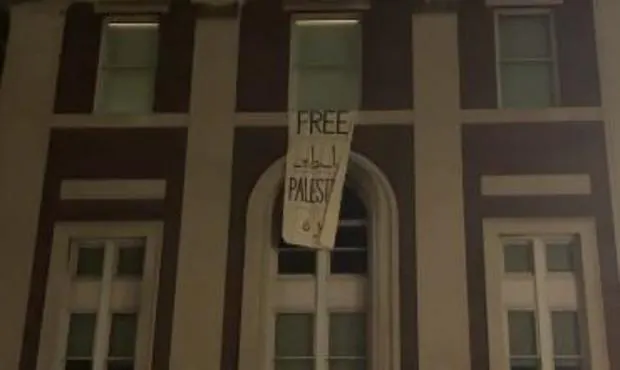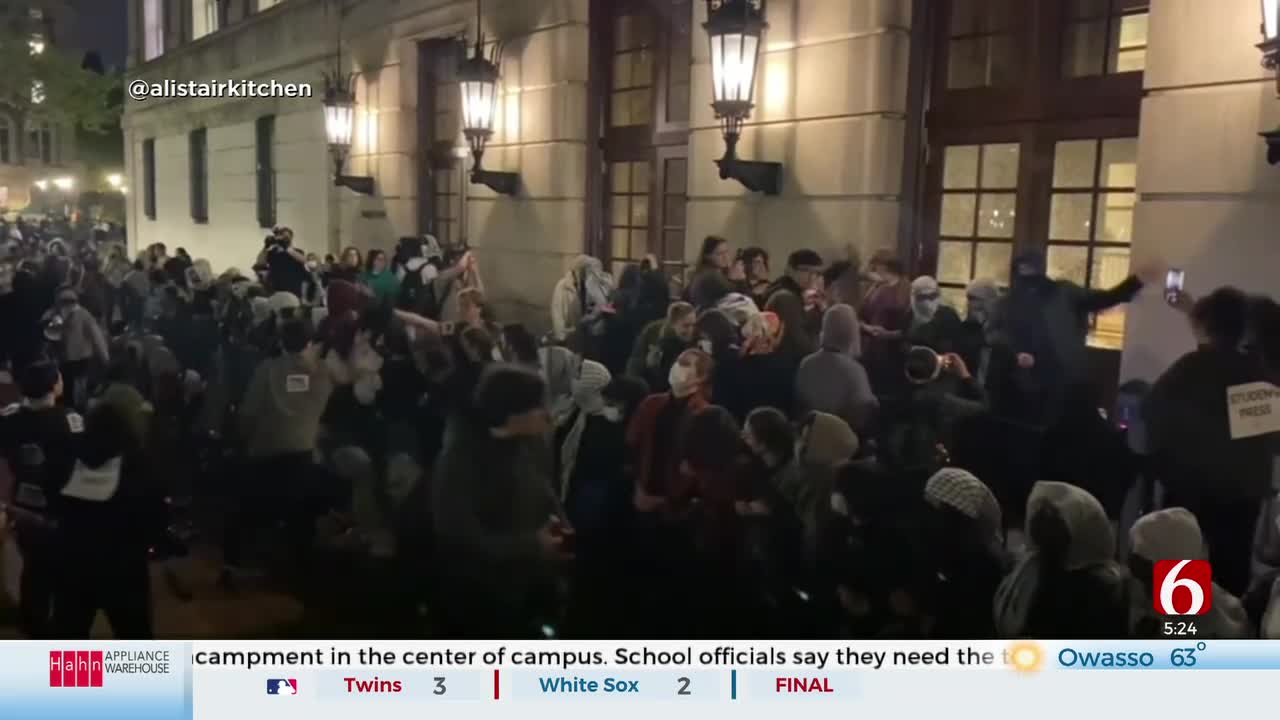Columbia Protesters Take Over Building Demonstrators Occupied During 1968 Protests
Columbia University says protesters occupied Hamilton Hall early Tuesday -- a building demonstrators took over during anti-Vietnam War protests in 1968.Tuesday, April 30th 2024, 5:35 am
NEW YORK -
Columbia University says protesters occupied Hamilton Hall early Tuesday -- a building demonstrators took over during anti-Vietnam War protests in 1968.
Witnesses said a large group of pro-Palestinian demonstrators gathered outside the hall before a smaller group stormed inside and barricaded themselves with desks, chairs and vending machines. Video showed them using a hammer to break the windows and then locking the doors from the inside, as more protesters cheered them on from outside.
In a public safety advisory issued overnight, the university asked students and staff to avoid the Morningside campus Tuesday.
"Early this morning, a group of protestors occupied Hamilton Hall on the Morningside campus. In light of the protest activity on campus, members of the University community who can avoid coming to the Morningside campus today (Tuesday, April 30) should do so; essential personnel should report to work according to university policy. Please check with your supervisor if you have any questions. Be aware that access to campus and other campus buildings may be restricted," the statement read in part.
A group representing the demonstrators also issued a news release overnight spelling out their demands.
Addressing the crowd in front of the building, one protester said, "We demand that Columbia divest all of its finances including the endowment from companies and institutions that profit from Israeli apartheid, genocide, and occupation in Palestine. … We will not stop until every single one of our demands are meant, until every single inch of Palestine is free."
So far, the NYPD has not been called onto campus, but has officers stationed outside. The campus is private property, so police cannot enter without being requested by the administration.
CBS News Producer Sean Herbert reported seeing a small contingent of officers at one spot and additional officers at another.
The protesters unfurled a large banner from a Hamilton Hall window saying "Free Palestine" — as seen in the image below from a video shot by Herbert:
 Image Provided By: CBS News
Image Provided By: CBS News
They also unfurled a banner renaming it Hind's Hall, after Hind Rajab, a six-year-old Palestinian killed in Gaza three months ago. Earlier, demonstrators said they'd set up a second encampment on campus.
Jessica Schwalb, a Columbia junior, told CBS News the campus is "lawless. Utter anarchy."
She said demonstrators in Hamilton Hall "zip-tied the door handles together and then broke the windows, bashed the windows with hammers and put these metal bike locks around the door handles. They put the bike lock on the first set of doors is what I saw and then they were bringing tables, the heavy black metal tables from the eating area that's right in front of Hamilton Hall, and had a group of people push them up against the door handles as a barricade and then people were also bringing furniture from Hamilton Hall to barricade inside."
"Basically, radio silence from the administration, from anyone Columbia related," another student named Jonas Du told CBS New York. "This whole thing started around midnight, and I got a text on my phone and an email at about 3:30 a.m."
Columbia protesters defy Monday deadline
Columbia imposed a 2 p.m. deadline Monday for the student protesters to dismantle their pro-Palestinian encampment. But as day turned into night, most of the students who spoke to CBS New York said they weren't going anywhere.
Hundreds of students marched and rallied on campus earlier in the day in support of their classmates, who have been camped out on the lawn for nearly two weeks in support of Palestinians.
After negotiating with protesters for several days, the Columbia administration announced the sides were not able to come to an agreement. Columbia said it will not divest from Israel but did offer to review student proposals and establish more transparency for the school's investment holdings.
That, however, was not enough for the pro-Palestinian demonstrators. As the deadline came and went, some faculty locked arms to protect the encampment, including Reinhold Martin, an architectural history professor.
"To defend their right to speak politically and peacefully," Martin said.
All of that happened on the same day some students filed a federal class action lawsuit against Columbia, arguing it has failed to protect them against antisemitism and harassment, violating its own policies.
"If they can enforce their procedures and restore campus to some sense of normalcy, then the lawsuit will go away," attorney Jay Edelson said.
Students who remain risk not ending semester in good standing
The Columbia administration circulated a letter to students on Monday telling protesters if they had voluntarily left the encampment by 2 p.m. and signed a form committing to abide by university policies, they would be eligible to complete the semester in good standing.
If not, they would be suspended indefinitely, barred from completing this semester, not allowed to graduate if seniors, and banned from campus and residential housing.
"This movement has sparked nationwide international movement, anti-war movement across U.S. colleges and universities, national universities. So we already achieved a lot by just starting this encampment and we will remain here until all U.S. universities, especially Columbia, will divest," student protest negotiator Mahmoud Khalil said. "The students made it clear they're willing to stay here as long as needed to achieve their demands."
"They're standing up for what is right and I'm standing up for them," student Michael Ostuno said of his support for the pro-Palestinian cause.
"I am happy Columbia is taking a stance to protect its Jewish and Israeli student body who have been fearful these past few weeks," one student said.
One student said he came to campus for the last day of classes despite having a virtual option.
"To show I'm not afraid and growing up in Israel a big recurring theme was 'never again' and I don't think Jews should be intimidated," the student said.
Graduation is scheduled for May 15 on the same lawn where the encampment is.
Encampment set up at Rutgers University
Students at Rutgers University set up an encampment at the New Brunswick campus on Monday after first holding a rally and then marching to the location.
They're trying to get the attention of the university's Board of Governors and the Joint Committee on Investments after they felt their request for the school to divest from Israel was ignored at a meeting on Thursday.
Earlier this month, more than 6,000 students voted in favor of a referendum calling on university administrators to withdraw investments in Israel and cancel the school's partnership with Tel Aviv University. More than 1,500 voted against the idea.
There are 44,000 students enrolled in New Brunswick. Those who spoke to CBS New York at Monday's rally declined to go on camera.
"I'm here to support our students, all of them, and to see what our students are going with, what they feel passionate about, and also, I believe in the cause, the idea of divesting being an important part to move our university toward a more moral position," said Kaiser Aslam, Muslim chaplain of the Rutgers Center for Islamic Life.
"I am Jewish and in terms of antisemitism at these rallies, I have never felt as safe anywhere as I do at these rallies. I have never felt as embraced as I do at these rallies," said Ellen Rosner, a local resident.
Rutgers says the request is under review and that the school's president, who has no direct role in the investment process, has made clear his personal opposition to the boycott, divestment and sanctions movement, and his support for the relationship with Tel Aviv University.
On Monday's rally he said, in part, "Our students want to make a difference in a struggle that has cost far too many innocent lives and that threatens so many more. I respect their right to protest in ways that do not interfere with university operations or with the ability of their fellow students to learn."
More Like This
March 30th, 2025
March 8th, 2025
September 20th, 2024
Top Headlines
March 30th, 2025
March 30th, 2025











